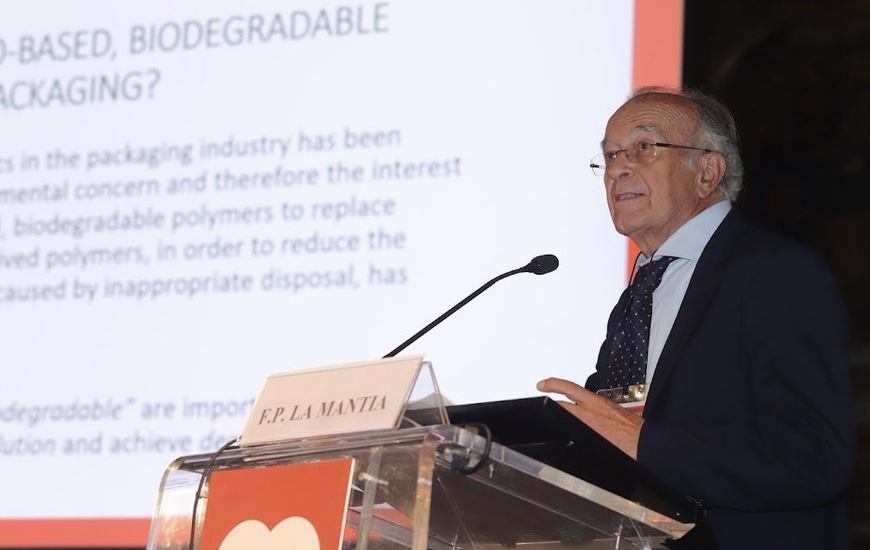Composites Portal as a "special correspondent" from Catania (Italy) will publish a series of interviews to some of the speakers of the national conference of AIMAT - the Italian Association of Materials Engineering. The first one is with Francesco Paolo La Mantia, Emeritus Professor and Polymer Technology Lecturer.
Professor La Mantia, should we talk not only about the end of life but also about the beginning of life of polymers, is that correct?
«Yes, exactly, and it cannot be otherwise if we want to talk about circular economy and circularity of plastic materials. When a polymer reaches the end of its life, not only for environmental reasons but also for economic reasons, we need to recover its material and energy content. Therefore, first and foremost, these materials need to be recycled through chemical or mechanical processes or, as a last resort, through energy recovery. But this discussion is connected to the beginning of life because if polymers come from fossil materials, which means petroleum in the case of polymers, and if the end of life for these materials is, for example, combustion, they release anthropogenic carbon dioxide into the environment, worsening the CO2 balance in the air».
So, what needs to be done?
«We need to make the most of the polymer as long as possible through mechanical or chemical recycling. To reduce the amount of CO2 released into the air, we need to go back to the beginning of life and try to produce polymers not from fossil sources but from renewable sources. In fact, if we look at the polymer not only as an object that becomes a nuisance at the end of its life but as an object that has produced CO2 that goes into the air, it is necessary for this CO2 to come from renewable sources because then it will be reused to produce, through photosynthesis, the biomass needed to create virgin polymer».
Can you give me a concrete example starting from a material?
«If I produce polyethylene from petroleum, to make one ton of polyethylene, I release about two tons of CO2 into the air. It is the sum of CO2 emissions from the moment we extract the petroleum to when we produce the object, referring to the entire energy life cycle analysis of the polymer. If, instead, I produce that polyethylene from a renewable source, the CO2 released into the air is equivalent to -1 because the renewable source used to make that bioplastic has absorbed CO2 from the environment. If I make the same polyethylene from petroleum but then recycle it, the recycled polymer will no longer emit two tons of CO2 because it bypasses the entire initial petroleum and polymerization phase, and it will only emit 0.5 tons. This means that we are significantly reducing the amount of CO2 emitted by the world of plastic materials into the environment. That's why I talk about the beginning and end of life: if CO2 originates from the beginning of life, we will find it at the end; if we avoid its generation from the beginning, it won't happen. This is the paradigm we are working with».
Where does this reasoning lead on a larger scale?
«Let me give you a number. Almost 400 million tons of plastic materials are introduced into the market worldwide. Since almost all of them are made from petroleum, they release about one billion tons of CO2 into the environment, which is equivalent to approximately 2.5% of all CO2 emissions. Therefore, recycling more, consuming a little less, and increasing the quantity of polymers from renewable sources could save almost one billion tons of CO2 per year in the environment. It's like saying that we wouldn't solve the CO2 problem, let's be careful, but I believe that every part of the industrial and general world should contribute to the solution of what is becoming a serious and current problem».
Will polymers, in this new perspective, be the materials of the future?
«Polymers are already the materials of the future because they possess so many characteristics that it's difficult to give them up. On the other hand, if we have gone from 100 million to 400 million tons in about thirty years, it means something. I believe that instead of continuing to be seen as a problem, they could become one of the elements in solving the CO2 problem in the environment».
What do you see in the future composites and applications in sustainable mobility?
«From what I read and analyze based on the numbers provided by companies, one of the sectors experiencing significant growth in the applications of biodegradable polymers and biocomposites, in general, is the automotive industry. I'm referring, for example, to hemp or simply wood flour. Automotive is becoming one of the targets for biodegradable polymers. There is also talk about it in aerospace, but we are still at the level of discussions and not practical applications. The issue with biodegradable polymers from renewable sources is that they cover the lower range of polymer characteristics. From this perspective, both thermoplastic and thermosetting biocomposites offer an additional advantage, such as a bit of rigidity that biodegradable polymers, which are primarily polyesters, currently lack».
WHO IS
Prof. Francesco Paolo La Mantia is an Emeritus Professor at the University of Palermo and teaches Polymer Technology and Plastic Material Recycling. His scientific activity has focused on the rheology and workability of polymer systems, polymer blends, nanocomposites, biodegradable polymers, and plastic material recycling. He has authored approximately 400 articles in international scientific journals, delivered over 300 presentations at national and international conferences, and has been invited to give plenary lectures at various conventions. He has held several institutional positions and served as the president of national and international scientific associations.
-

-
29 May 2023






















